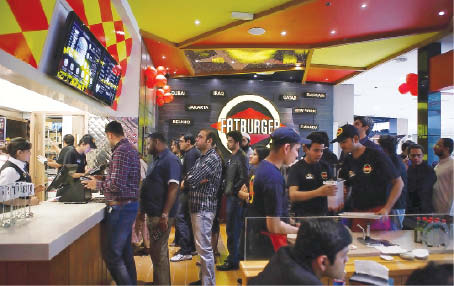
“I’ve been coming here every alternate day for the past month to see if it’s opened yet or not,” Hana Khan, consultant for restaurant delivery website foodpanda, said at the January 5 launch of Fatburger, a Beverly Hills, California-based hamburger chain that also operates in 14 countries outside the United States. Within two hours of the doors opening, all 130 seats inside were taken and dozens of people were waiting at the ordering counter.
Local and overseas business groups are queuing up to buy franchise rights in Pakistan for an array of popular food sold from Los Angeles to Kuala Lumpur, driven by rising demand from a booming middle class in South Asia’s second-biggest economy after India. Pakistanis increasingly flock to American food outlets even as ties between the two nations are strained.
Johnny Rockets Group Inc, another American fast-food group based in Aliso Viejo, California, that operates or franchises 68 hamburger restaurants in 16 countries, Second Cup Ltd, a coffee shop chain based in Missisauga, Canada, with over 360 cafes and Malaysia’s MammaRoti and PappaRoti are set to open their first stores in Pakistan this year.
“Food is universal, it transcends politics,” Don Berchtold, President and Chief Operating Officer of Fatburger North America Inc, said. “In food, people don’t look at relations between countries. They just want to eat.”
The company, which was founded in 1952, plans to open four more stores in Pakistan over the next three years, including its biggest in the eastern city of Lahore with a capacity to seat as many as 175 people.
Since 2011, several food chains have opened their first outlets in the world’s sixth-most populous nation, including Hardee’s Food Systems Inc, headquartered in St Louis; Atlanta-based cinnamon roll maker Cinnabon International Inc; The Noodle House of the United Arab Emirates; and five foreign frozen yogurt chains.
Consumer spending in Pakistan has increased at a 26 percent average pace the past three years, compared with 7.7 percent for Asia, according to data compiled by Euromonitor International, a consumer research firm.
Taliban insurgencies along the border with Afghanistan, nationwide bombings and political unrest have plagued Pakistan’s economy, limiting growth to an average of three percent a year. Even so, Pakistan’s middle class has doubled to 70 million people in the past decade as booms in agriculture and residential property, as well as jobs in telecom and media have helped people prosper, according to Sakib Sherani, Chief Executive Officer at Macroeconomic Insights in Islamabad.
As Pakistanis join the middle class, they seek international cuisines made popular by the television and Internet boom of the past decade. A traditional Pakistani diet consists of curries, lentils and wheat bread.
Franchising is also booming as businesses battling Pakistan’s record energy outages seek alternatives to factories that can’t run without adequate power, said Samiullah Mohabbat, Chief Executive Officer of Fatburger Pakistan and the country representative for the World Franchise Association. Mohabbat received over 100 queries this year from entrepreneurs wanting to buy franchise rights for international food chains. “In this business, you get money in your pocket from the very first day,” he said.
The number of foreign food franchises in Pakistan will “easily double” in the next two years as more coffee houses and casual dining outlets enter the country, Mohabbat said. About two dozen foreign food franchises operate in Pakistan since Louisville, Kentucky-based Yum Brands Inc’s Pizza Hut opened two decades ago, followed by the same company’s KFC in 1997 and Oak Brook, Illinois-based McDonald’s Corp, the following year.
KFC plans to open 40 more stores in Pakistan over the next five years to expand its network of 64 outlets in 18 cities, said Rafiq Rangoonwala, Chief Executive Officer of Cupola, the company with the franchise rights for KFC, the biggest fast-food chain by outlets in Pakistan.
Pakistanis spend Rs90bn ($924m) a year on eating out at the 20,000 restaurants nationwide because of a paucity of other entertainment facilities, said Nauman Mirza, founder and Chief Executive Officer of Food Connection Pakistan, an online restaurant guide. Luxury shopping malls in major cities have also given foreign retail and food franchises the opportunity to open stores in a modern setting.
“Pakistan is an amazing destination for food outlets because eating out has become the nation’s biggest source of entertainment,” said Ghulam Hussain Soomro, owner of Berrylicious, a local frozen yoghurt chain that opened in 2011. “Every new place that opens up is packed because the spending power of the masses when it comes to eating out is amazing.”







